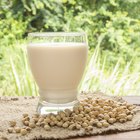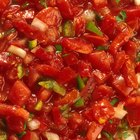
fenlio/iStock/Getty Images
Despite a smell like rotting garbage, stinky tofu offers great flavor and multiple health benefits to aficionados. Stinky tofu is tofu that has been soaked in a brine made from fermented vegetables. The brine might also contain dried shrimp, greens, bamboo shoots and herbs – enhancing its stinkiness. Stinky tofu provides the nutritional qualities of regular tofu and the benefits of healthy bacteria created with fermentation.
The Basics
Stinky tofu is a popular street food in Taiwan, Indonesia and China. It is sometimes fried, served with a sweet and spicy sauce, sautéed or served without any embellishment as a side dish. Cubes of tofu are marinated in the smelly brine for several days, weeks or months. Stinky tofu is only available in certain regions and specialty markets in the United States.
Tofu Benefits
Tofu is a vegan source of protein that is low in fat. You can use it to replace animal-based proteins that contain higher amounts of artery-clogging saturated fats. Eating tofu instead of meat laden with saturated fat can help reduce cholesterol levels. Tofu is made from soybeans, which might help reduce your incidence of breast and prostate cancer – but studies are inconclusive. Soy foods might also help ease the symptoms of menopause.
Fermentation
Fermenting the tofu creates healthy bacteria, called probiotics, which help populate the gut and improve digestion. In the United States, yogurt is one of the most common sources of probiotics, but if you can stomach the smell of stinky tofu, it can offer similar healthy bacterial benefits. Like natto -- a mashed, cheese-like soybean-fermented food -- stinky tofu might also confer antioxidant benefits. Antioxidants help fight disease-causing free radicals in the body.
Diabetes
The January 2010 issue of “Nutrition Research” published a review finding that consumption of fermented soybean products might help prevent or at least delay the progression of type 2 diabetes, compared with consumption of nonfermented soybeans. Studies performed on animals and humans found that certain isoflavonoids and bioactive peptides, or specific plant compounds, form during fermentation and these might reduce insulin resistance and boost insulin secretion.
Related Articles

Fiber in Soybeans

Calories in Tofu Cream Cheese

Is Allantoin a Relative of the Lanolin ...

A List of Foods Containing Microbes

How to Freeze Tzatziki

Whole Milk Vs. Lactaid Milk

What is Healthier: Greek Yogurt or ...

Skin Care Products That Contain ...

What Is Balkan Yogurt?

Are Bean Sprouts Good for You?

What Type of Microorganism Is Used to ...

Feta Cheese Nutrition

What Are the Health Benefits of Pico De ...

Foods High in Probiotics & Electrolytes

Foods to Prevent Jaundice

Baking Substitutions for Ricotta Cheese

Dates & Yogurt Diet

Pros & Cons of Parabens

Sources of Calcium in Indian Food

What Foods Provide Calcium D-Glucarate?
References
Writer Bio
Andrea Boldt has been in the fitness industry for more than 20 years. A personal trainer, run coach, group fitness instructor and master yoga teacher, she also holds certifications in holistic and fitness nutrition.
Photo Credits
fenlio/iStock/Getty Images